Contract Law Assignment: Ingredients, Types, Cases, and Relationships
VerifiedAdded on 2020/03/23
|8
|2666
|84
Homework Assignment
AI Summary
This assignment delves into the core ingredients of a contract, including offer, acceptance, consideration, intention to be in a legal relationship, and the capacity of the parties. It differentiates between oral and written contracts, highlighting the advantages of written agreements. The assignment further explores formal contracts, outlining their definition, formalities, and types such as contracts of record and contracts under seal or deed. A significant portion of the assignment analyzes a case study concerning the intention of parties in a contractual relation, specifically addressing a lottery ticket scenario. The assignment concludes by examining the relationships between principal, agent, and independent contractors, clarifying the liabilities and responsibilities within each arrangement.

1
Cover Page
Name of the student
Student ID
word count
Cover Page
Name of the student
Student ID
word count
Paraphrase This Document
Need a fresh take? Get an instant paraphrase of this document with our AI Paraphraser
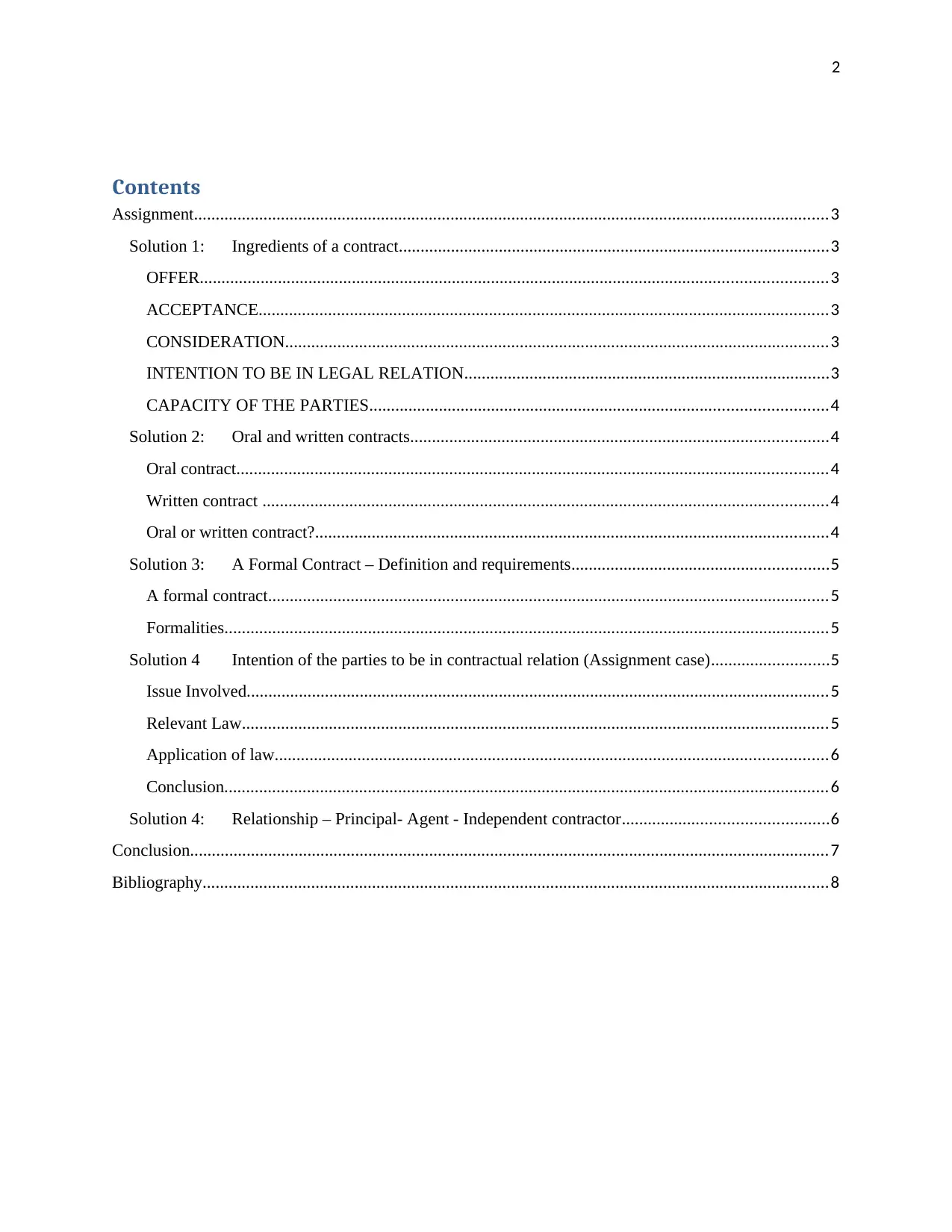
2
Contents
Assignment..................................................................................................................................................3
Solution 1: Ingredients of a contract...................................................................................................3
OFFER................................................................................................................................................3
ACCEPTANCE...................................................................................................................................3
CONSIDERATION.............................................................................................................................3
INTENTION TO BE IN LEGAL RELATION....................................................................................3
CAPACITY OF THE PARTIES.........................................................................................................4
Solution 2: Oral and written contracts................................................................................................4
Oral contract........................................................................................................................................4
Written contract ..................................................................................................................................4
Oral or written contract?......................................................................................................................4
Solution 3: A Formal Contract – Definition and requirements...........................................................5
A formal contract.................................................................................................................................5
Formalities...........................................................................................................................................5
Solution 4 Intention of the parties to be in contractual relation (Assignment case)...........................5
Issue Involved......................................................................................................................................5
Relevant Law.......................................................................................................................................5
Application of law...............................................................................................................................6
Conclusion...........................................................................................................................................6
Solution 4: Relationship – Principal- Agent - Independent contractor...............................................6
Conclusion...................................................................................................................................................7
Bibliography................................................................................................................................................8
Contents
Assignment..................................................................................................................................................3
Solution 1: Ingredients of a contract...................................................................................................3
OFFER................................................................................................................................................3
ACCEPTANCE...................................................................................................................................3
CONSIDERATION.............................................................................................................................3
INTENTION TO BE IN LEGAL RELATION....................................................................................3
CAPACITY OF THE PARTIES.........................................................................................................4
Solution 2: Oral and written contracts................................................................................................4
Oral contract........................................................................................................................................4
Written contract ..................................................................................................................................4
Oral or written contract?......................................................................................................................4
Solution 3: A Formal Contract – Definition and requirements...........................................................5
A formal contract.................................................................................................................................5
Formalities...........................................................................................................................................5
Solution 4 Intention of the parties to be in contractual relation (Assignment case)...........................5
Issue Involved......................................................................................................................................5
Relevant Law.......................................................................................................................................5
Application of law...............................................................................................................................6
Conclusion...........................................................................................................................................6
Solution 4: Relationship – Principal- Agent - Independent contractor...............................................6
Conclusion...................................................................................................................................................7
Bibliography................................................................................................................................................8
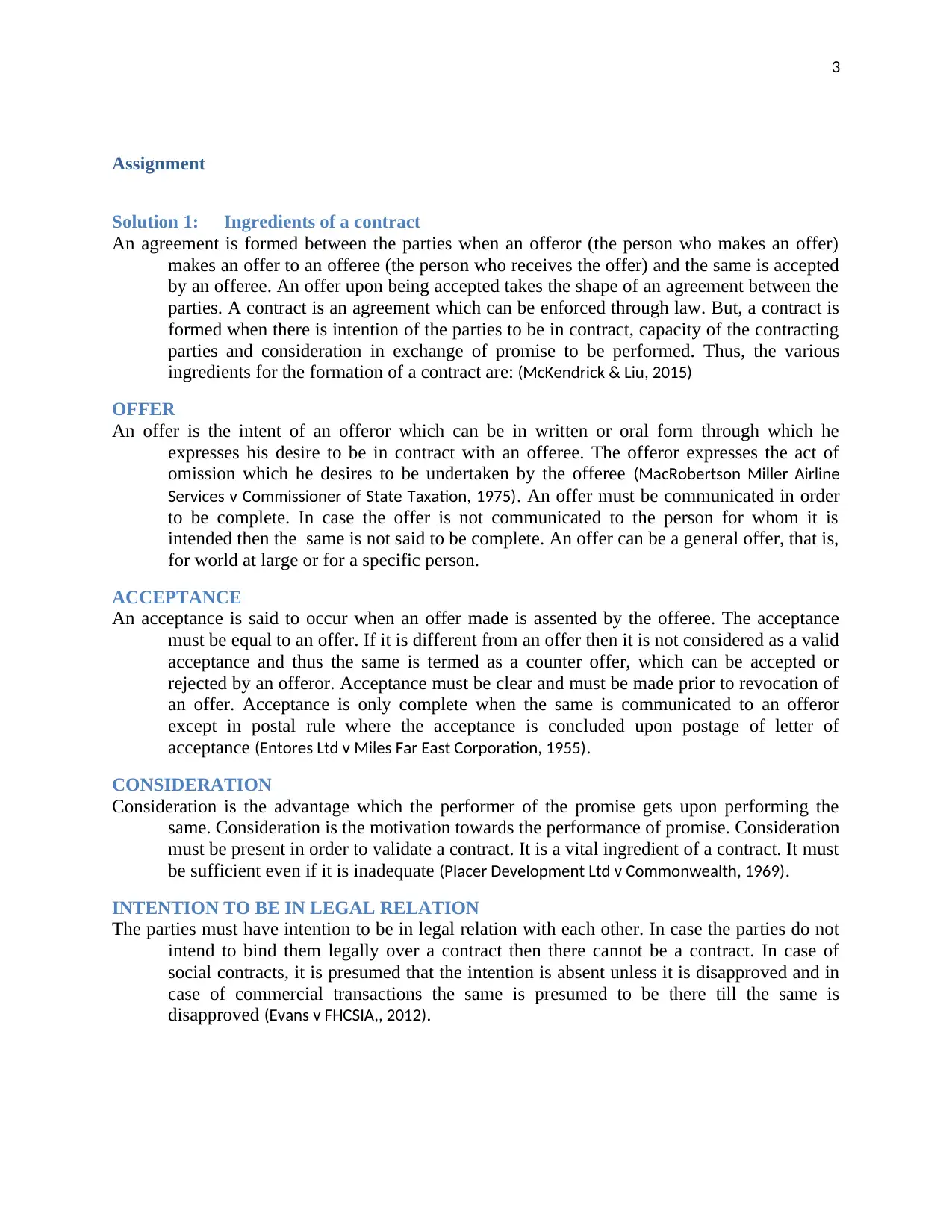
3
Assignment
Solution 1: Ingredients of a contract
An agreement is formed between the parties when an offeror (the person who makes an offer)
makes an offer to an offeree (the person who receives the offer) and the same is accepted
by an offeree. An offer upon being accepted takes the shape of an agreement between the
parties. A contract is an agreement which can be enforced through law. But, a contract is
formed when there is intention of the parties to be in contract, capacity of the contracting
parties and consideration in exchange of promise to be performed. Thus, the various
ingredients for the formation of a contract are: (McKendrick & Liu, 2015)
OFFER
An offer is the intent of an offeror which can be in written or oral form through which he
expresses his desire to be in contract with an offeree. The offeror expresses the act of
omission which he desires to be undertaken by the offeree (MacRobertson Miller Airline
Services v Commissioner of State Taxation, 1975). An offer must be communicated in order
to be complete. In case the offer is not communicated to the person for whom it is
intended then the same is not said to be complete. An offer can be a general offer, that is,
for world at large or for a specific person.
ACCEPTANCE
An acceptance is said to occur when an offer made is assented by the offeree. The acceptance
must be equal to an offer. If it is different from an offer then it is not considered as a valid
acceptance and thus the same is termed as a counter offer, which can be accepted or
rejected by an offeror. Acceptance must be clear and must be made prior to revocation of
an offer. Acceptance is only complete when the same is communicated to an offeror
except in postal rule where the acceptance is concluded upon postage of letter of
acceptance (Entores Ltd v Miles Far East Corporation, 1955).
CONSIDERATION
Consideration is the advantage which the performer of the promise gets upon performing the
same. Consideration is the motivation towards the performance of promise. Consideration
must be present in order to validate a contract. It is a vital ingredient of a contract. It must
be sufficient even if it is inadequate (Placer Development Ltd v Commonwealth, 1969).
INTENTION TO BE IN LEGAL RELATION
The parties must have intention to be in legal relation with each other. In case the parties do not
intend to bind them legally over a contract then there cannot be a contract. In case of
social contracts, it is presumed that the intention is absent unless it is disapproved and in
case of commercial transactions the same is presumed to be there till the same is
disapproved (Evans v FHCSIA,, 2012).
Assignment
Solution 1: Ingredients of a contract
An agreement is formed between the parties when an offeror (the person who makes an offer)
makes an offer to an offeree (the person who receives the offer) and the same is accepted
by an offeree. An offer upon being accepted takes the shape of an agreement between the
parties. A contract is an agreement which can be enforced through law. But, a contract is
formed when there is intention of the parties to be in contract, capacity of the contracting
parties and consideration in exchange of promise to be performed. Thus, the various
ingredients for the formation of a contract are: (McKendrick & Liu, 2015)
OFFER
An offer is the intent of an offeror which can be in written or oral form through which he
expresses his desire to be in contract with an offeree. The offeror expresses the act of
omission which he desires to be undertaken by the offeree (MacRobertson Miller Airline
Services v Commissioner of State Taxation, 1975). An offer must be communicated in order
to be complete. In case the offer is not communicated to the person for whom it is
intended then the same is not said to be complete. An offer can be a general offer, that is,
for world at large or for a specific person.
ACCEPTANCE
An acceptance is said to occur when an offer made is assented by the offeree. The acceptance
must be equal to an offer. If it is different from an offer then it is not considered as a valid
acceptance and thus the same is termed as a counter offer, which can be accepted or
rejected by an offeror. Acceptance must be clear and must be made prior to revocation of
an offer. Acceptance is only complete when the same is communicated to an offeror
except in postal rule where the acceptance is concluded upon postage of letter of
acceptance (Entores Ltd v Miles Far East Corporation, 1955).
CONSIDERATION
Consideration is the advantage which the performer of the promise gets upon performing the
same. Consideration is the motivation towards the performance of promise. Consideration
must be present in order to validate a contract. It is a vital ingredient of a contract. It must
be sufficient even if it is inadequate (Placer Development Ltd v Commonwealth, 1969).
INTENTION TO BE IN LEGAL RELATION
The parties must have intention to be in legal relation with each other. In case the parties do not
intend to bind them legally over a contract then there cannot be a contract. In case of
social contracts, it is presumed that the intention is absent unless it is disapproved and in
case of commercial transactions the same is presumed to be there till the same is
disapproved (Evans v FHCSIA,, 2012).
⊘ This is a preview!⊘
Do you want full access?
Subscribe today to unlock all pages.

Trusted by 1+ million students worldwide
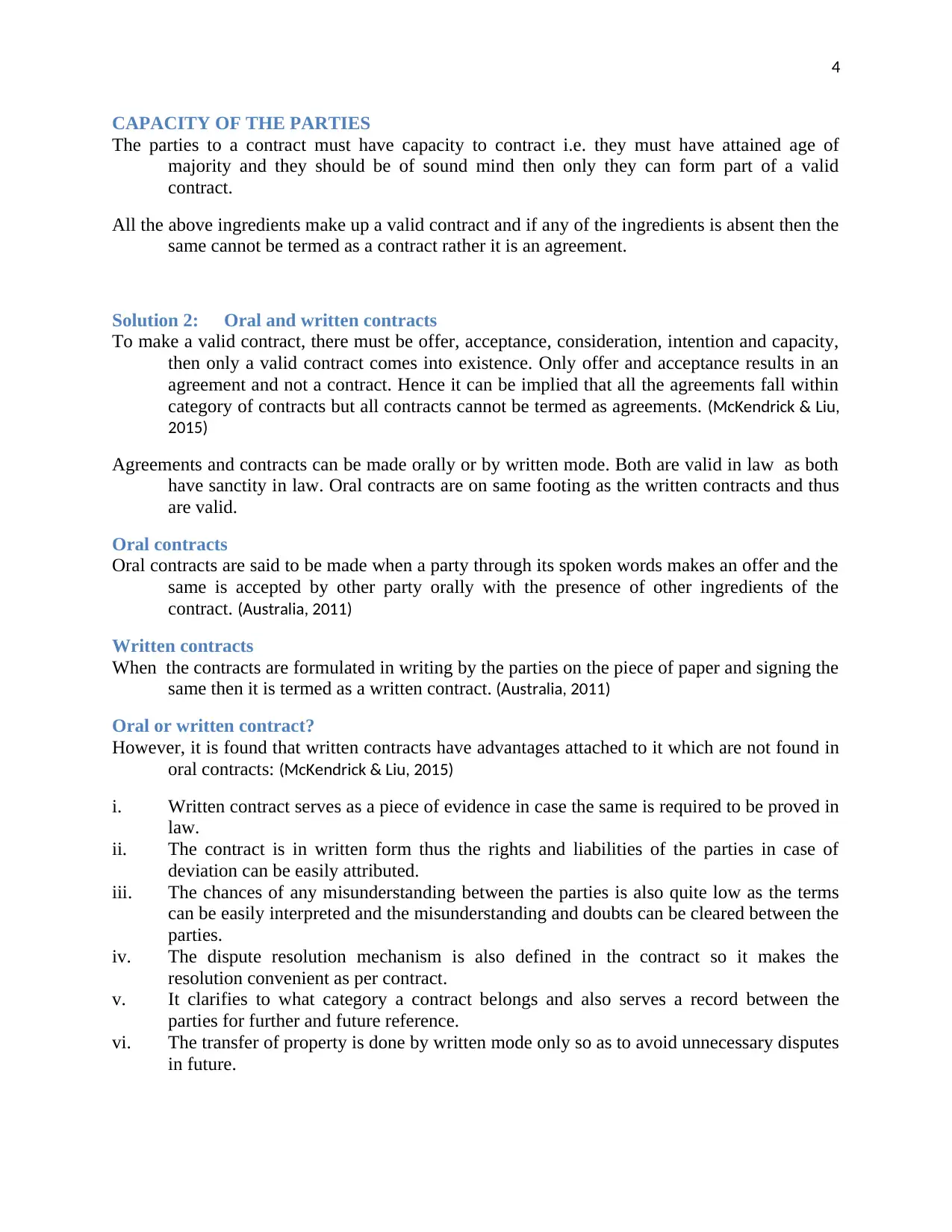
4
CAPACITY OF THE PARTIES
The parties to a contract must have capacity to contract i.e. they must have attained age of
majority and they should be of sound mind then only they can form part of a valid
contract.
All the above ingredients make up a valid contract and if any of the ingredients is absent then the
same cannot be termed as a contract rather it is an agreement.
Solution 2: Oral and written contracts
To make a valid contract, there must be offer, acceptance, consideration, intention and capacity,
then only a valid contract comes into existence. Only offer and acceptance results in an
agreement and not a contract. Hence it can be implied that all the agreements fall within
category of contracts but all contracts cannot be termed as agreements. (McKendrick & Liu,
2015)
Agreements and contracts can be made orally or by written mode. Both are valid in law as both
have sanctity in law. Oral contracts are on same footing as the written contracts and thus
are valid.
Oral contracts
Oral contracts are said to be made when a party through its spoken words makes an offer and the
same is accepted by other party orally with the presence of other ingredients of the
contract. (Australia, 2011)
Written contracts
When the contracts are formulated in writing by the parties on the piece of paper and signing the
same then it is termed as a written contract. (Australia, 2011)
Oral or written contract?
However, it is found that written contracts have advantages attached to it which are not found in
oral contracts: (McKendrick & Liu, 2015)
i. Written contract serves as a piece of evidence in case the same is required to be proved in
law.
ii. The contract is in written form thus the rights and liabilities of the parties in case of
deviation can be easily attributed.
iii. The chances of any misunderstanding between the parties is also quite low as the terms
can be easily interpreted and the misunderstanding and doubts can be cleared between the
parties.
iv. The dispute resolution mechanism is also defined in the contract so it makes the
resolution convenient as per contract.
v. It clarifies to what category a contract belongs and also serves a record between the
parties for further and future reference.
vi. The transfer of property is done by written mode only so as to avoid unnecessary disputes
in future.
CAPACITY OF THE PARTIES
The parties to a contract must have capacity to contract i.e. they must have attained age of
majority and they should be of sound mind then only they can form part of a valid
contract.
All the above ingredients make up a valid contract and if any of the ingredients is absent then the
same cannot be termed as a contract rather it is an agreement.
Solution 2: Oral and written contracts
To make a valid contract, there must be offer, acceptance, consideration, intention and capacity,
then only a valid contract comes into existence. Only offer and acceptance results in an
agreement and not a contract. Hence it can be implied that all the agreements fall within
category of contracts but all contracts cannot be termed as agreements. (McKendrick & Liu,
2015)
Agreements and contracts can be made orally or by written mode. Both are valid in law as both
have sanctity in law. Oral contracts are on same footing as the written contracts and thus
are valid.
Oral contracts
Oral contracts are said to be made when a party through its spoken words makes an offer and the
same is accepted by other party orally with the presence of other ingredients of the
contract. (Australia, 2011)
Written contracts
When the contracts are formulated in writing by the parties on the piece of paper and signing the
same then it is termed as a written contract. (Australia, 2011)
Oral or written contract?
However, it is found that written contracts have advantages attached to it which are not found in
oral contracts: (McKendrick & Liu, 2015)
i. Written contract serves as a piece of evidence in case the same is required to be proved in
law.
ii. The contract is in written form thus the rights and liabilities of the parties in case of
deviation can be easily attributed.
iii. The chances of any misunderstanding between the parties is also quite low as the terms
can be easily interpreted and the misunderstanding and doubts can be cleared between the
parties.
iv. The dispute resolution mechanism is also defined in the contract so it makes the
resolution convenient as per contract.
v. It clarifies to what category a contract belongs and also serves a record between the
parties for further and future reference.
vi. The transfer of property is done by written mode only so as to avoid unnecessary disputes
in future.
Paraphrase This Document
Need a fresh take? Get an instant paraphrase of this document with our AI Paraphraser
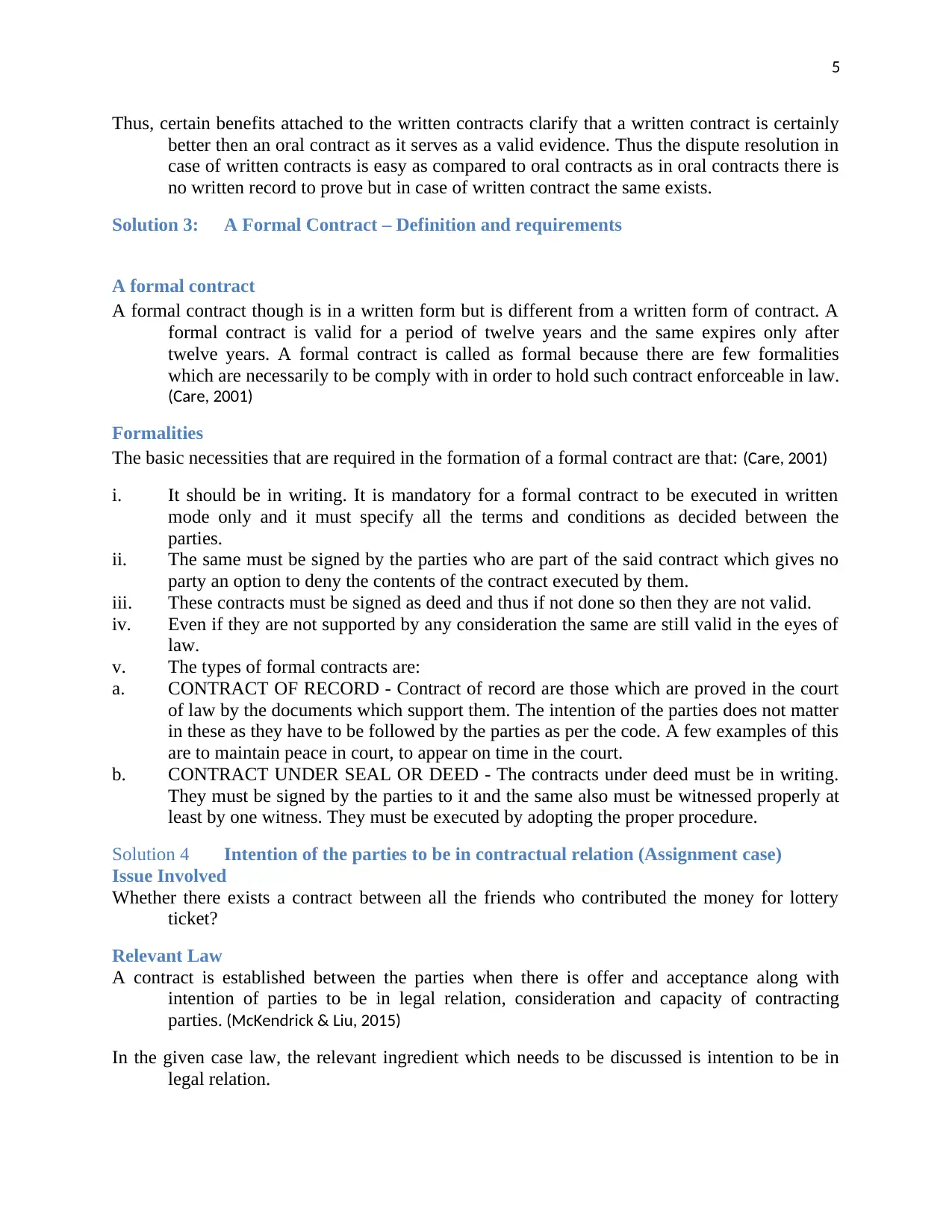
5
Thus, certain benefits attached to the written contracts clarify that a written contract is certainly
better then an oral contract as it serves as a valid evidence. Thus the dispute resolution in
case of written contracts is easy as compared to oral contracts as in oral contracts there is
no written record to prove but in case of written contract the same exists.
Solution 3: A Formal Contract – Definition and requirements
A formal contract
A formal contract though is in a written form but is different from a written form of contract. A
formal contract is valid for a period of twelve years and the same expires only after
twelve years. A formal contract is called as formal because there are few formalities
which are necessarily to be comply with in order to hold such contract enforceable in law.
(Care, 2001)
Formalities
The basic necessities that are required in the formation of a formal contract are that: (Care, 2001)
i. It should be in writing. It is mandatory for a formal contract to be executed in written
mode only and it must specify all the terms and conditions as decided between the
parties.
ii. The same must be signed by the parties who are part of the said contract which gives no
party an option to deny the contents of the contract executed by them.
iii. These contracts must be signed as deed and thus if not done so then they are not valid.
iv. Even if they are not supported by any consideration the same are still valid in the eyes of
law.
v. The types of formal contracts are:
a. CONTRACT OF RECORD - Contract of record are those which are proved in the court
of law by the documents which support them. The intention of the parties does not matter
in these as they have to be followed by the parties as per the code. A few examples of this
are to maintain peace in court, to appear on time in the court.
b. CONTRACT UNDER SEAL OR DEED - The contracts under deed must be in writing.
They must be signed by the parties to it and the same also must be witnessed properly at
least by one witness. They must be executed by adopting the proper procedure.
Solution 4 Intention of the parties to be in contractual relation (Assignment case)
Issue Involved
Whether there exists a contract between all the friends who contributed the money for lottery
ticket?
Relevant Law
A contract is established between the parties when there is offer and acceptance along with
intention of parties to be in legal relation, consideration and capacity of contracting
parties. (McKendrick & Liu, 2015)
In the given case law, the relevant ingredient which needs to be discussed is intention to be in
legal relation.
Thus, certain benefits attached to the written contracts clarify that a written contract is certainly
better then an oral contract as it serves as a valid evidence. Thus the dispute resolution in
case of written contracts is easy as compared to oral contracts as in oral contracts there is
no written record to prove but in case of written contract the same exists.
Solution 3: A Formal Contract – Definition and requirements
A formal contract
A formal contract though is in a written form but is different from a written form of contract. A
formal contract is valid for a period of twelve years and the same expires only after
twelve years. A formal contract is called as formal because there are few formalities
which are necessarily to be comply with in order to hold such contract enforceable in law.
(Care, 2001)
Formalities
The basic necessities that are required in the formation of a formal contract are that: (Care, 2001)
i. It should be in writing. It is mandatory for a formal contract to be executed in written
mode only and it must specify all the terms and conditions as decided between the
parties.
ii. The same must be signed by the parties who are part of the said contract which gives no
party an option to deny the contents of the contract executed by them.
iii. These contracts must be signed as deed and thus if not done so then they are not valid.
iv. Even if they are not supported by any consideration the same are still valid in the eyes of
law.
v. The types of formal contracts are:
a. CONTRACT OF RECORD - Contract of record are those which are proved in the court
of law by the documents which support them. The intention of the parties does not matter
in these as they have to be followed by the parties as per the code. A few examples of this
are to maintain peace in court, to appear on time in the court.
b. CONTRACT UNDER SEAL OR DEED - The contracts under deed must be in writing.
They must be signed by the parties to it and the same also must be witnessed properly at
least by one witness. They must be executed by adopting the proper procedure.
Solution 4 Intention of the parties to be in contractual relation (Assignment case)
Issue Involved
Whether there exists a contract between all the friends who contributed the money for lottery
ticket?
Relevant Law
A contract is established between the parties when there is offer and acceptance along with
intention of parties to be in legal relation, consideration and capacity of contracting
parties. (McKendrick & Liu, 2015)
In the given case law, the relevant ingredient which needs to be discussed is intention to be in
legal relation.
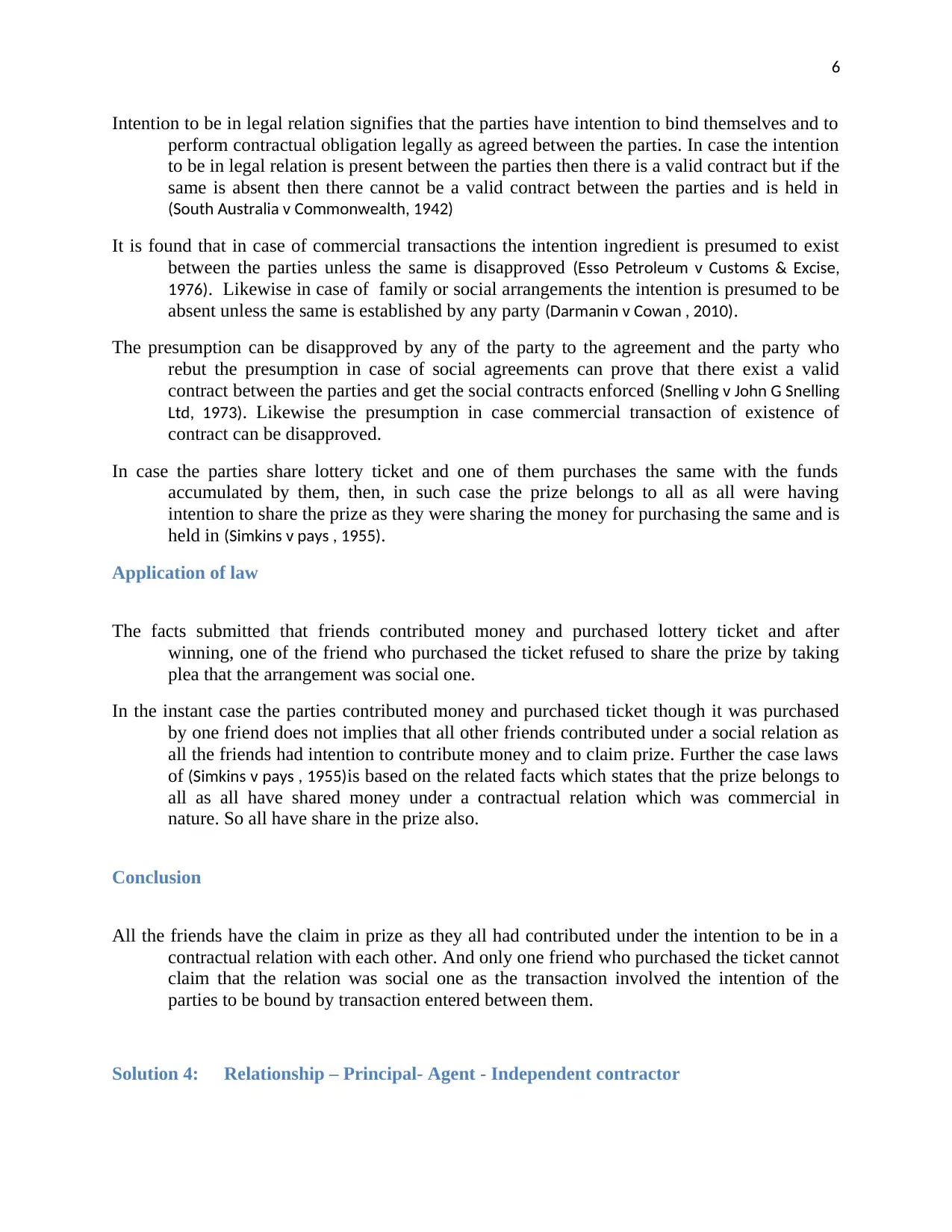
6
Intention to be in legal relation signifies that the parties have intention to bind themselves and to
perform contractual obligation legally as agreed between the parties. In case the intention
to be in legal relation is present between the parties then there is a valid contract but if the
same is absent then there cannot be a valid contract between the parties and is held in
(South Australia v Commonwealth, 1942)
It is found that in case of commercial transactions the intention ingredient is presumed to exist
between the parties unless the same is disapproved (Esso Petroleum v Customs & Excise,
1976). Likewise in case of family or social arrangements the intention is presumed to be
absent unless the same is established by any party (Darmanin v Cowan , 2010).
The presumption can be disapproved by any of the party to the agreement and the party who
rebut the presumption in case of social agreements can prove that there exist a valid
contract between the parties and get the social contracts enforced (Snelling v John G Snelling
Ltd, 1973). Likewise the presumption in case commercial transaction of existence of
contract can be disapproved.
In case the parties share lottery ticket and one of them purchases the same with the funds
accumulated by them, then, in such case the prize belongs to all as all were having
intention to share the prize as they were sharing the money for purchasing the same and is
held in (Simkins v pays , 1955).
Application of law
The facts submitted that friends contributed money and purchased lottery ticket and after
winning, one of the friend who purchased the ticket refused to share the prize by taking
plea that the arrangement was social one.
In the instant case the parties contributed money and purchased ticket though it was purchased
by one friend does not implies that all other friends contributed under a social relation as
all the friends had intention to contribute money and to claim prize. Further the case laws
of (Simkins v pays , 1955)is based on the related facts which states that the prize belongs to
all as all have shared money under a contractual relation which was commercial in
nature. So all have share in the prize also.
Conclusion
All the friends have the claim in prize as they all had contributed under the intention to be in a
contractual relation with each other. And only one friend who purchased the ticket cannot
claim that the relation was social one as the transaction involved the intention of the
parties to be bound by transaction entered between them.
Solution 4: Relationship – Principal- Agent - Independent contractor
Intention to be in legal relation signifies that the parties have intention to bind themselves and to
perform contractual obligation legally as agreed between the parties. In case the intention
to be in legal relation is present between the parties then there is a valid contract but if the
same is absent then there cannot be a valid contract between the parties and is held in
(South Australia v Commonwealth, 1942)
It is found that in case of commercial transactions the intention ingredient is presumed to exist
between the parties unless the same is disapproved (Esso Petroleum v Customs & Excise,
1976). Likewise in case of family or social arrangements the intention is presumed to be
absent unless the same is established by any party (Darmanin v Cowan , 2010).
The presumption can be disapproved by any of the party to the agreement and the party who
rebut the presumption in case of social agreements can prove that there exist a valid
contract between the parties and get the social contracts enforced (Snelling v John G Snelling
Ltd, 1973). Likewise the presumption in case commercial transaction of existence of
contract can be disapproved.
In case the parties share lottery ticket and one of them purchases the same with the funds
accumulated by them, then, in such case the prize belongs to all as all were having
intention to share the prize as they were sharing the money for purchasing the same and is
held in (Simkins v pays , 1955).
Application of law
The facts submitted that friends contributed money and purchased lottery ticket and after
winning, one of the friend who purchased the ticket refused to share the prize by taking
plea that the arrangement was social one.
In the instant case the parties contributed money and purchased ticket though it was purchased
by one friend does not implies that all other friends contributed under a social relation as
all the friends had intention to contribute money and to claim prize. Further the case laws
of (Simkins v pays , 1955)is based on the related facts which states that the prize belongs to
all as all have shared money under a contractual relation which was commercial in
nature. So all have share in the prize also.
Conclusion
All the friends have the claim in prize as they all had contributed under the intention to be in a
contractual relation with each other. And only one friend who purchased the ticket cannot
claim that the relation was social one as the transaction involved the intention of the
parties to be bound by transaction entered between them.
Solution 4: Relationship – Principal- Agent - Independent contractor
⊘ This is a preview!⊘
Do you want full access?
Subscribe today to unlock all pages.

Trusted by 1+ million students worldwide
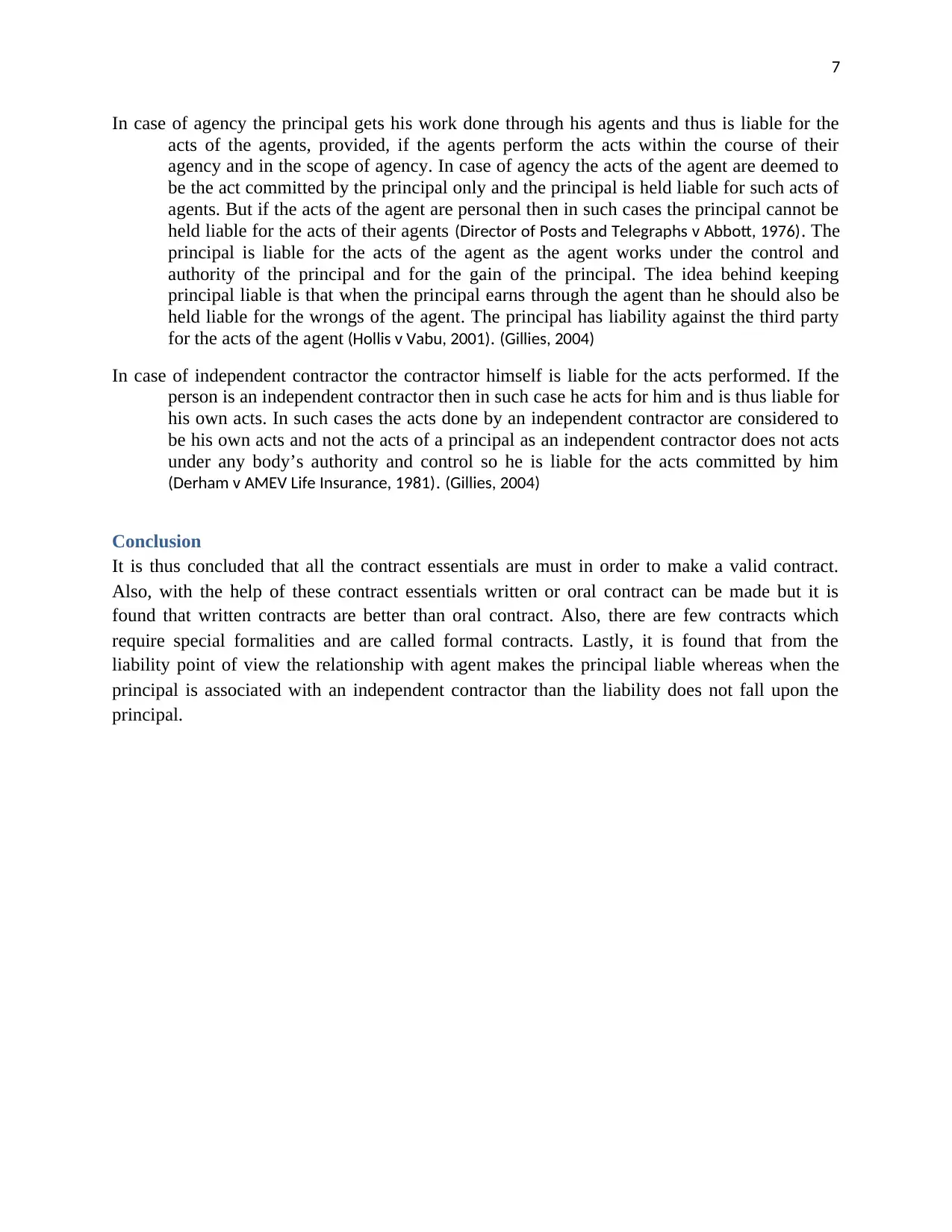
7
In case of agency the principal gets his work done through his agents and thus is liable for the
acts of the agents, provided, if the agents perform the acts within the course of their
agency and in the scope of agency. In case of agency the acts of the agent are deemed to
be the act committed by the principal only and the principal is held liable for such acts of
agents. But if the acts of the agent are personal then in such cases the principal cannot be
held liable for the acts of their agents (Director of Posts and Telegraphs v Abbott, 1976). The
principal is liable for the acts of the agent as the agent works under the control and
authority of the principal and for the gain of the principal. The idea behind keeping
principal liable is that when the principal earns through the agent than he should also be
held liable for the wrongs of the agent. The principal has liability against the third party
for the acts of the agent (Hollis v Vabu, 2001). (Gillies, 2004)
In case of independent contractor the contractor himself is liable for the acts performed. If the
person is an independent contractor then in such case he acts for him and is thus liable for
his own acts. In such cases the acts done by an independent contractor are considered to
be his own acts and not the acts of a principal as an independent contractor does not acts
under any body’s authority and control so he is liable for the acts committed by him
(Derham v AMEV Life Insurance, 1981). (Gillies, 2004)
Conclusion
It is thus concluded that all the contract essentials are must in order to make a valid contract.
Also, with the help of these contract essentials written or oral contract can be made but it is
found that written contracts are better than oral contract. Also, there are few contracts which
require special formalities and are called formal contracts. Lastly, it is found that from the
liability point of view the relationship with agent makes the principal liable whereas when the
principal is associated with an independent contractor than the liability does not fall upon the
principal.
In case of agency the principal gets his work done through his agents and thus is liable for the
acts of the agents, provided, if the agents perform the acts within the course of their
agency and in the scope of agency. In case of agency the acts of the agent are deemed to
be the act committed by the principal only and the principal is held liable for such acts of
agents. But if the acts of the agent are personal then in such cases the principal cannot be
held liable for the acts of their agents (Director of Posts and Telegraphs v Abbott, 1976). The
principal is liable for the acts of the agent as the agent works under the control and
authority of the principal and for the gain of the principal. The idea behind keeping
principal liable is that when the principal earns through the agent than he should also be
held liable for the wrongs of the agent. The principal has liability against the third party
for the acts of the agent (Hollis v Vabu, 2001). (Gillies, 2004)
In case of independent contractor the contractor himself is liable for the acts performed. If the
person is an independent contractor then in such case he acts for him and is thus liable for
his own acts. In such cases the acts done by an independent contractor are considered to
be his own acts and not the acts of a principal as an independent contractor does not acts
under any body’s authority and control so he is liable for the acts committed by him
(Derham v AMEV Life Insurance, 1981). (Gillies, 2004)
Conclusion
It is thus concluded that all the contract essentials are must in order to make a valid contract.
Also, with the help of these contract essentials written or oral contract can be made but it is
found that written contracts are better than oral contract. Also, there are few contracts which
require special formalities and are called formal contracts. Lastly, it is found that from the
liability point of view the relationship with agent makes the principal liable whereas when the
principal is associated with an independent contractor than the liability does not fall upon the
principal.
Paraphrase This Document
Need a fresh take? Get an instant paraphrase of this document with our AI Paraphraser
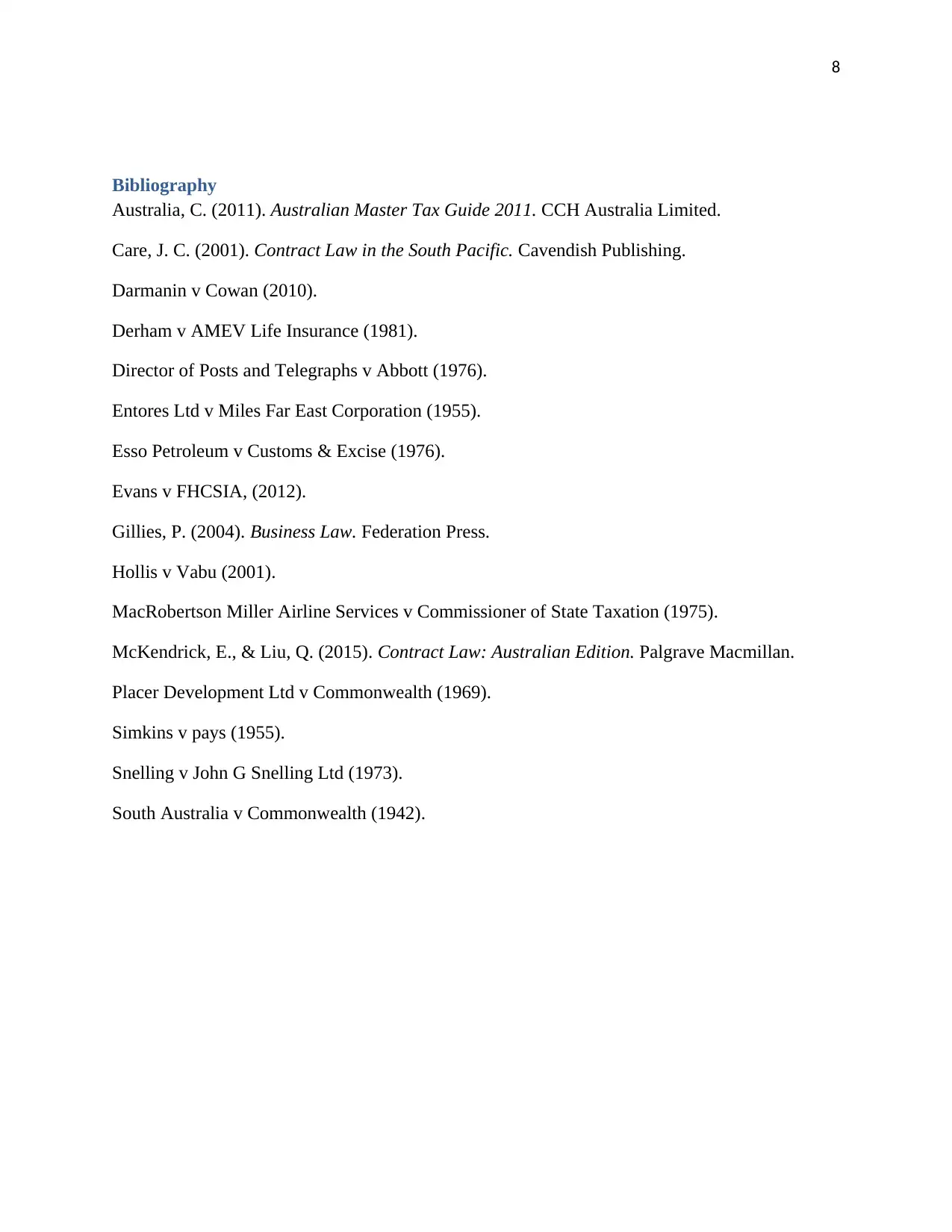
8
Bibliography
Australia, C. (2011). Australian Master Tax Guide 2011. CCH Australia Limited.
Care, J. C. (2001). Contract Law in the South Pacific. Cavendish Publishing.
Darmanin v Cowan (2010).
Derham v AMEV Life Insurance (1981).
Director of Posts and Telegraphs v Abbott (1976).
Entores Ltd v Miles Far East Corporation (1955).
Esso Petroleum v Customs & Excise (1976).
Evans v FHCSIA, (2012).
Gillies, P. (2004). Business Law. Federation Press.
Hollis v Vabu (2001).
MacRobertson Miller Airline Services v Commissioner of State Taxation (1975).
McKendrick, E., & Liu, Q. (2015). Contract Law: Australian Edition. Palgrave Macmillan.
Placer Development Ltd v Commonwealth (1969).
Simkins v pays (1955).
Snelling v John G Snelling Ltd (1973).
South Australia v Commonwealth (1942).
Bibliography
Australia, C. (2011). Australian Master Tax Guide 2011. CCH Australia Limited.
Care, J. C. (2001). Contract Law in the South Pacific. Cavendish Publishing.
Darmanin v Cowan (2010).
Derham v AMEV Life Insurance (1981).
Director of Posts and Telegraphs v Abbott (1976).
Entores Ltd v Miles Far East Corporation (1955).
Esso Petroleum v Customs & Excise (1976).
Evans v FHCSIA, (2012).
Gillies, P. (2004). Business Law. Federation Press.
Hollis v Vabu (2001).
MacRobertson Miller Airline Services v Commissioner of State Taxation (1975).
McKendrick, E., & Liu, Q. (2015). Contract Law: Australian Edition. Palgrave Macmillan.
Placer Development Ltd v Commonwealth (1969).
Simkins v pays (1955).
Snelling v John G Snelling Ltd (1973).
South Australia v Commonwealth (1942).
1 out of 8
Related Documents
Your All-in-One AI-Powered Toolkit for Academic Success.
+13062052269
info@desklib.com
Available 24*7 on WhatsApp / Email
![[object Object]](/_next/static/media/star-bottom.7253800d.svg)
Unlock your academic potential
Copyright © 2020–2026 A2Z Services. All Rights Reserved. Developed and managed by ZUCOL.





